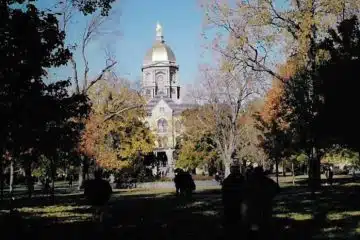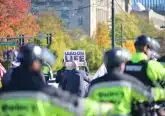Archbishop urges religious freedom action
Special to The Catholic Telegraph
January 16 letter details strategy based on prayer; shares details of pending court cases
Archbishop Dennis M. Schnurr has urged the priests of the Archdiocese of Cincinnati to participate in a strategy of prayer and information about the issue of religious liberty in the United States.
In a letter dated Jan. 16, the archbishop reminded his priests one year ago the U.S. Department of Health and Human Services (HHS) issued a mandate under the Affordable Care Act that requires all employer health plans to provide free contraceptives, sterilizations and abortion-inducing drugs, regardless of any moral or religious objections.
“Moreover, under the mandate,” the archbishop wrote, “some ministries of institutions like Catholic schools, hospitals, and charities may not be considered sufficiently religious to qualify for the mandate’s narrow ‘religious exemption.’”
He explained it became clear the constitutionality of the rule would have to be challenged in the courts since neither the administration nor the Congress were likely to provide relief.
“Once again, I urge you to participate in the five-part strategy or call to prayer that was approved by the U.S. Bishops last November,” he wrote, “recognizing the power of prayer as well as the importance of keeping the faithful informed on the critical issue of religious liberty.” The strategy includes prayer, worship, fast and abstinence and other spiritual disciplines.
Archbishop Schnurr also asked that all parishes in the Archdiocese of Cincinnati participate in the Project Life and Liberty postcard campaign, which was first announced Jan. 3.
Through his office, the archbishop offered an update on the scores of court cases filed against the mandate. “While the listing is not exhaustive, it does give some indication of the thinking of the courts and the Obama administration at this point in time.”
The following summary was provided the archdiocesan priests:
Nov. 2, 2012: A federal district court judge in Ann Arbor granted a Michigan business, Weingartz Supply Co., a temporary injunction from the HHS mandate. The same judge dismissed a lawsuit filed by the nonprofit group, Legatus, because he said the religious organization qualified for the Obama administration’s temporary “safe harbor” from having to comply with the mandate. But he also stipulated the federal government must provide monthly updates on the status of the process for amending final regulations covered by the safe harbor period.
Nov. 20, 2012: The Tenth Circuit Court of Appeals denied similar relief to Hobby Lobby, a privately owned retail chain. The court ruled that the “Plaintiffs have not cited, and the court has not found, any case concluding that secular, for-profit corporations such as Hobby Lobby and Mardel have a constitutional right to the free exercise of religion.” In response, Hobby Lobby sought, and was denied, an emergency injunction from the U.S. Supreme Court, sending the case back to the U.S. District Court of Oklahoma. In the meantime, Hobby Lobby has decided to continue offering employees health insurance without provision for emergency contraception, which could result in a $1.3 million penalty per day.
Nov. 28, 2012: A panel of the Eighth Circuit Court of Appeals granted a preliminary injunction that temporarily stops the HHS mandate from being implemented against a St. Louis Catholic business owner. The order essentially prevents the HHS mandate from being implemented against O’Brien Industrial Holdings, a holding company that operates several businesses that explore, mine, and process refractory and ceramic raw material, employing 87 people.
Dec. 10, 2012: A Mennonite-owned cabinetmaker, Conestoga Wood Specialties, filed federal suits in U.S. District Court charging that the HHS mandate violates their constitutional rights. The court gave the company a temporary reprieve while the case proceeds through the court.
Dec. 11, 2012: For the first time, a federal court permitted an HHS mandate challenge by a religious nonprofit organization to go forward. The U.S. District Court for the Eastern District of New York found that the government’s temporary enforcement suspension against religious employers, which the Obama administration labels a “safe harbor,” was insufficient to protect the Archdiocese of New York and two of its affiliated health care non-profits from the threat of immediate harm. The defendants – the U.S. Departments of Health and Human Services, Labor, and the Treasury – had filed a request that the case be dismissed, claiming the mandate is not causing “imminent injury” and that the government plans changes to accommodate religious groups that object to the requirement on moral grounds. In his Dec. 5 decision, Judge Brian M. Cogan of the U.S. District Court for the Eastern District of New York rejected the defendants’ claim, saying the mandate “has caused and will continue to cause plaintiffs harm so long as it remains in place. The departments’ possible decision to amend their polices does not abrogate plaintiffs’ right to seek relief for their injuries,” he said. “The First Amendment does not require citizens to accept assurances from the government that, if the government later determines it has made a misstep, it will take ameliorative action,” Cogan said. “There is no, ‘Trust us changes are coming’ clause in the Constitution.”
Dec. 13, 2012: The Illinois Attorney General announced that the State would not appeal a judicial ruling that protects Illinois pharmacists’ conscience rights. In September, 2012, an Illinois appellate court ruled against the “Blagojevich Rule,” a regulation that would have forced Illinois pharmacists to dispense abortion-inducing drugs despite their religious and moral convictions. The State had been expected to appeal to the Illinois Supreme Court, but, after seven years of litigation, the attorney general bowed to judicial rulings telling the State to respect pharmacists’ conscience rights.
Dec. 19, 2012: An appeals court reinstated lawsuits from Wheaton College and Belmont Abbey College against the HHS mandate, overruling district courts that had ruled the lawsuits “premature” due to the “safe harbor” provisions of the Obama administration. The court also forced the Obama administration into conceding that the HHS mandate will be substantially reworked in the near future. Administration officials stated that revised rules will offer stronger protection for religious schools and employers that seek exemptions from the HHS mandate. The appellate court also ordered the Obama administration to report back every 60 days – starting in mid-February – until the Administration makes good on its promise to issue a new rule that protects the Colleges’ religious freedom. The new rule must be issued by March 31, 2013. Subsequently, HHS officials said they would issue a notice that it was creating new rules in the first quarter of 2013 and would finalize those rules before Aug. 1, 2013.
Dec. 22, 2012: The U.S. District Court for the Western District of Missouri issued a preliminary injunction against the government from enforcing the HHS mandate against a private company, American Pulverizer Co., whose owners are Evangelical Christians who argue that the use of contraceptives is contrary to their religious beliefs. The current insurance plans cover contraceptive services, but the plaintiffs wish to change the plan to exclude contraceptive services. The court noted that the preliminary injunction is granted because the plaintiffs do not qualify for any exemption or safe harbor from enforcement, they are not religious employers under the terms of the Affordable Care Act, they do not qualify for safe harbor available to non-profits, and they do not qualify for the grandfathered status. Finally, the court held that the government could not satisfy its burden to demonstrate that it is advancing a compelling state interest in imposing the mandate in light of the numerous exceptions contained in the law: “these exemptions undermine any compelling interest in applying the preventative coverage to Plaintiffs.”
Dec. 22, 2012: A U.S. District Court issued a temporary restraining order against a Missouri law which would grant conscience protection to employers and health plans who object to providing employees with contraception coverage in employee health plans. The court ruled that the law conflicts with an insurance mandate under the Affordable Care Act.
Dec. 29, 2012: The U.S. Court of Appeals for the Seventh Circuit granted an emergency injunction against the enforcement of the HHS mandate to Korte & Luitjohan, Inc., a family-owned construction contractor in Illinois. In issuing its opinion, the court stated its disagreement with the Tenth Circuit’s decision to reject Hobby Lobby’s request for a similar injunction.
Jan. 2, 2013: A district court gave Domino’s Farm Corp. an injunction from having to implement the HHS mandate. The court stated, “The harm of delaying the implementation of a statute that may later be deemed constitutional is outweighed by the risk of substantially burdening the free exercise of religion.”
Jan. 4, 2013: The U.S. District Court for Northern Illinois granted a preliminary injunction against the HHS mandate to Triune Health Group, Inc., a Catholic health care service company.
Jan. 7, 2013: The U.S. District Court for the Eastern District of New York (Brooklyn) granted a request for an injunction against enforcement of the HHS mandate made by Priests for Life. The federal government entered into a stipulation that it would not enforce the HHS mandate against Priests for Life pending a revision in the rules that would protect religious liberty.
Jan. 7, 2013: According to one report, in ten of thirteen cases, the owners of for-profit businesses have obtained injunctive relief against the HHS mandate.
Jan. 9, 2013: A federal judge dismissed the lawsuit filed by the Evangelical liberal arts institution Colorado Christian University. The judge dismissed the case because the Obama Administration plans to revise the rules to possibly expand the very narrow religious exemption in them. The government had argued the case was not ripe for judicial review because it plans to issue new regulations to accommodate religious objections of employers like the university, and the school is protected from any enforcement action against it until at least July 2, 2014.













